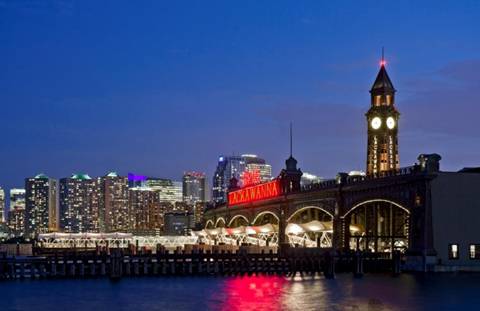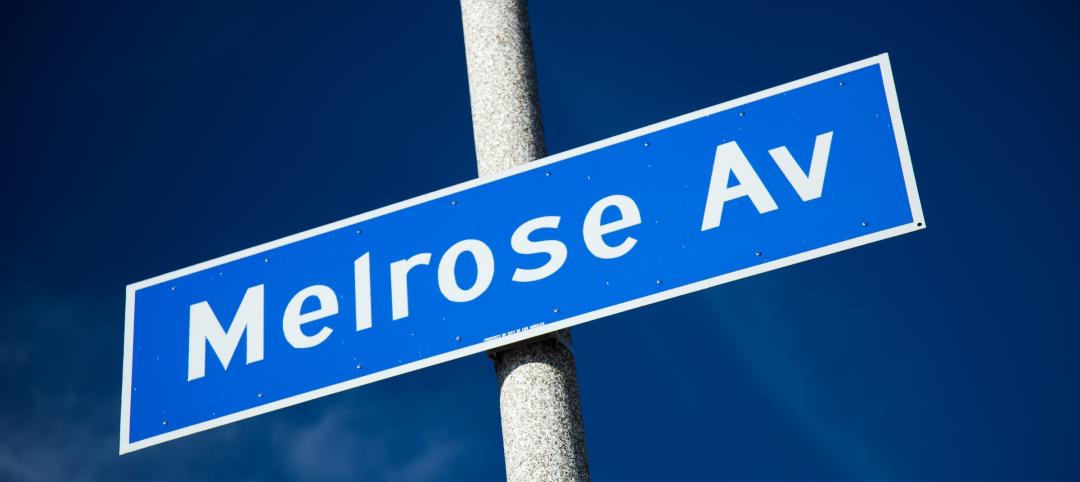New Jersey Department of Transportation Commissioner and NJ TRANSIT Board Chairman James Simpson and NJ TRANSIT Executive Director James Weinstein joined local, state and federal officials recently celebrated the completion of a project that returned a portion of Hoboken Terminal to its original design—restoring permanent ferry service to the historic building.
The historic, Beaux-Arts style terminal and its ferry slips were originally built by the Delaware, Lackawanna and Western Railroad in 1907. Hoboken ferry service was discontinued in 1967 due to declining demand, but was reintroduced in 1989 at a temporary facility at the southern end of the terminal building.
In early 2003, NJ TRANSIT and the Port Authority entered into an agreement to allow for the restoration of the Hoboken Terminal ferry slips and supporting infrastructure, with the goal of returning ferry service to its original location, while protecting and enhancing the historic elements of the terminal.
The $120 million project, funded through a mixture of state, federal and Port Authority funding, was divided into three phases. The first phase, which began in April 2004 and was completed in September 2005, included repairs to the terminal’s substructure and superstructure.
Work on the second phase began in December 2005 and was completed in April 2008, including construction of a 230-foot tall clock tower replica modeled after the original 1907 design by architect Kenneth Murchison. In homage to the original, the clock tower includes four-foot-high copper letters spelling out the word “Lackawanna” and is surmounted by an illuminated clock with four 12-foot diameter faces, one on each side of the tower.
The second phase also included marine construction of five of the original six ferry slips, as well as restoration of the exterior copper facade and lighting on the river side of the terminal, structural repairs, roof repairs and demolition of the finger piers and wooden fenders.
Construction of the ferry boarding area was completed in the third and final phase, along with all remaining work necessary to restore ferry service to the original slips, including work on utilities, lighting, the ticketing area, ferry barges and gangways.
NY Waterway, owned and operated by Port Imperial Ferry Corp and Billybey Ferry Co., will be providing service from the ferry slips. NY Waterway provides the largest privately-owned commuter ferry service in the U.S., carrying 35,000 passenger trips per day – 8 million trips per year, including service between New Jersey and Manhattan.
Hoboken Terminal currently provides travelers multiple transit options including commuter rail, light rail, bus, PATH and ferry service. Nearly 60,000 people use the terminal on a typical weekday. BD+C
Related Stories
Cultural Facilities | Aug 21, 2024
Baltimore’s National Aquarium opens 10,000-sf floating wetland that mimics the harbor’s original tidal marsh habitat
The National Aquarium in Baltimore has opened the National Aquarium Harbor Wetland, a 10,000-sf floating wetland that mimics the Inner Harbor’s original Chesapeake Bay tidal marsh habitat. Located between Piers 3 and 4 on Baltimore’s Inner Harbor, the $14 million project features more than 32,000 native shrubs and marsh grasses.
Mixed-Use | Aug 21, 2024
Adaptive reuse of a Sears store becomes luxury mixed-use housing
6 Corners Lofts at 4714 W Irving Park Road, Chicago, Ill., opened in March of 2024 as a 394,000-sf adaptive reuse project born out of a former Sears store.
Building Materials | Aug 19, 2024
Federal 'buy clean' construction materials label program unveiled
The U.S. Environmental Protection Agency announced a plan for implementing a new label program to boost American production of more climate-friendly construction materials and products. The label program will prioritize steel, glass, asphalt and concrete.
Museums | Aug 19, 2024
The Tampa Museum of Art will soon undergo a $110 million expansion
In Tampa, Fla., the Tampa Museum of Art will soon undergo a 77,904-sf Centennial Expansion project. The museum plans to reach its $110 million fundraising goal by late 2024 or early 2025 and then break ground. Designed by Weiss/Manfredi, and with construction manager The Beck Group, the expansion will redefine the museum’s surrounding site.
AEC Tech | Aug 19, 2024
Harnessing AI to revolutionize architectural design and creativity
Architects are wondering if AI will replace us. For Vessel, the gains offset the fear. We believe there is wisdom in the unattributed quote, “You won’t lose your job to AI. You will lose your job to someone using AI.”
Reconstruction & Renovation | Aug 19, 2024
Movement to protect historic buildings raises sharp criticism
While the movement to preserve historic buildings has widespread support, it also has some sharp critics with well-funded opposition groups springing up in recent years. Some opponents are linked to the Stand Together Foundation, founded and bankrolled by the Koch family’s conservative philanthropic organization, according to a column in Governing magazine.
Government Buildings | Aug 19, 2024
GSA posts new RFI for enabling energy efficiency, decarbonization in commercial buildings
The U.S. General Services Administration (GSA), in collaboration with the U.S. Department of Energy, recently released a new Request For Information (RFI) focused on enabling energy efficiency and decarbonization in commercial buildings. GSA wants to test innovative technologies through GSA’s Center for Emerging Building Technologies.
MFPRO+ New Projects | Aug 16, 2024
At 60 stories, the Paramount multifamily development will stand as Nashville’s tallest high rise
When complete, the 60-story Paramount building, at 750 feet high, will be the tallest high rise tower in Nashville, Tenn., surpassing the city’s current record holder, the 617-foot AT&T Building. The $390 million Paramount project recently launched condo sales after securing more than $230 million in construction financing.
Urban Planning | Aug 15, 2024
New York City begins first large-scale porous pavement installation
New York City is installing its first large-scale porous pavement installation along seven miles of roadway in Brooklyn. The project will keep 35 million gallons of stormwater out of the combined sewer system each year, according to a news release.
Urban Planning | Aug 15, 2024
The magic of L.A.’s Melrose Mile
Great streets are generally not initially curated or willed into being. Rather, they emerge organically from unintentional synergies of commercial, business, cultural and economic drivers. L.A.’s Melrose Avenue is a prime example.

















